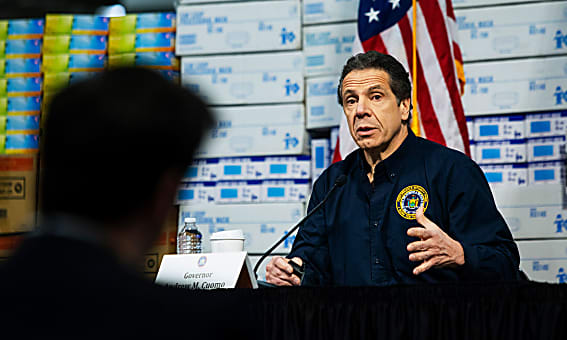
(Bloomberg) -- The biggest federal stimulus program in history doesn’t go far enough for state and localities facing unprecedented financial pressure brought on by the coronavirus pandemic, according to U.S. governors whose states have been hardest hit by the crisis.
The White House and Democratic senators reached an early morning agreement Wednesday on a $2 trillion package to combat the virus. While negotiations over expanded unemployment benefits for low-wage workers threatened to delay it in the Senate, Treasury Secretary Steven Mnuchin said he expects passage tonight in that chamber.
The bill sets aside nearly $275 billion in emergency funds for state and local governments including $100 billion for hospitals, $45 billion in disaster relief funds, and $25 billion for transit systems, according to the Senate Appropriations Committee. There is also an expected $150 billion virus fund for states.
“We still need more federal resources directly to the states that are on the front lines of this crisis,” Maryland Governor Larry Hogan, a Republican who chairs the National Governors Association, said at a press conference Wednesday. “We’re gonna come back and ask for additional funding for the states and local governments to help with this crisis in the next round of stimulus.”
New York Governor Andrew Cuomo, whose state is the epicenter of the U.S. outbreak, slammed the deal as insufficient. New Jersey’s Governor Phil Murphy applauded the package as a positive development while acknowledging that his state with the second-highest number of cases will likely need additional aid, and Governor Gavin Newsom of California, which has the third-highest U.S. case count, said he strongly believes the federal government will need to do more. All three are Democrats.
Unemployment Benefits
The bill expands unemployment benefits to include those impacted by the virus who are self-employed or independent contractors who wouldn’t normally qualify for regular unemployment insurance, said Michele Evermore, a senior researcher and policy analyst for the National Employment Law Project. The bill also adds an extra $600 a week on top of state benefits.
While this would be a “tremendous boost” for millions of unemployed Americans and should get passed, it’s still not enough, according to Evermore. After the last recession, states ran out of trust fund money for unemployment benefits and had to borrow from the federal government, she said. With jobless claims expected to surge this week, some states with already low trust funds will be overwhelmed, Evermore warned.
“The claims data we’re going to see tomorrow will be shocking,” Evermore said. “States are going to run out of money.”
New York state’s unemployment claim system is so strained that it is asking individuals to file on specific days based on the letter of their last name. In California, one million people have filed since March 13.
Revenue Losses
Uncertainty surrounding the economic damage the virus will inflict on state budgets and the fluidity of the crisis means some states are still trying to assess the impact of the bill. New York’s response to the virus has already cost the state $1 billion, and it is currently facing a $15 billion loss in revenue, Governor Cuomo said.
New York has the most infections, reporting 5,146 new confirmed cases, for a total of almost 31,000 on Wednesday. There were nearly 3,000 new cases in New York City, for a total of almost 18,000.
New York City Mayor Bill de Blasio echoed Cuomo’s comments, describing the federal help as “nowhere close to what we need.”
Still, some state leaders were optimistic about the deal. Louisiana Governor John Bel Edwards, a Democrat, said the funding “would be immensely helpful” at a briefing in Baton Rouge on Wednesday afternoon.
And New Jersey’s Murphy described the federal stimulus as a positive development, adding that it covers hospital, mass transit, unemployment and other support systems that the state will rely on in the coming weeks and months.
“It isn’t everything, let there be no doubt about it. We’ll likely need more,” Murphy said. “It’s a big step in the right direction, and we’ll take it.”
For more articles like this, please visit us at bloomberg.com
©2020 Bloomberg L.P.